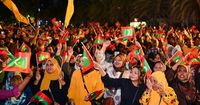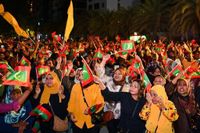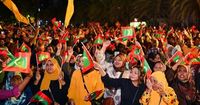On the night of October 3, 2025, the usually tranquil streets of Male, the capital of the Maldives, erupted with the chants of thousands demanding change. The opposition Maldivian Democratic Party (MDP) led a massive protest accusing President Mohamed Muizzu’s government of corruption, curtailing basic freedoms, and worsening living conditions. The demonstration, one of the largest in the archipelago nation this year, ended with clashes, the use of force by police, and the arrest of eight demonstrators—events that have since sent ripples through the country’s political landscape.
The Maldives, a collection of idyllic islands southwest of Sri Lanka and the southern tip of India, is more often in the news for its turquoise waters and celebrity visitors than for political turmoil. But beneath the postcard-perfect surface, the country’s democracy is facing a period of significant strain. According to the Associated Press, protesters gathered overnight, hurling accusations at the government for “corruption and curtailment of basic freedoms.” The demonstration quickly escalated, with police alleging that marchers violated pre-agreed conditions, used unauthorized routes, and threw rocks and water bottles.
The MDP, the country’s largest opposition party, organized the protest with a clear set of demands: the reversal of recent constitutional changes that they say have narrowed fundamental rights and expanded the president’s powers, and the implementation of universal public health care. The party also called for an end to new restrictions on decentralized power by island councils, the withdrawal of a law allowing authorities to fine and suspend or cancel media licenses, and accountability for what they describe as mismanagement of state enterprises.
Former president Ibrahim Mohamed Solih and former foreign minister Abdulla Shahid, both prominent MDP figures, joined demonstrators in the streets. Protesters carried Maldivian flags and chanted “Lootuvaifi, Lootuvaifi!”—translated as “Stop the Loot”—as they marched through Male, according to News18. Their message was direct: they accused the Muizzu administration of enabling widespread graft, suppressing independent media, and failing to address rising prices that are squeezing household budgets across the islands.
The police, for their part, responded with pepper spray and Long-Range Acoustic Devices (LRADs) to disperse the crowd. Eight people were arrested after clashes broke out, with the Maldives Police Service stating on X (formerly Twitter) that protesters had “violated conditions agreed upon before the march, used unauthorized roads and threw rocks and water bottles.” The police also claimed that demonstrators forcibly seized equipment from an on-duty officer, an action they argued could not be considered “peaceful political activity.”
The government’s version of events, shared in an official statement on Saturday, emphasized its support for the right to peaceful assembly but insisted that Friday’s rally had crossed the line. It argued that protesters defied a designated route, forced their way into Majeedhee Magu—the busiest street in Male—broke police barricades, and disrupted public order. “The Maldives Police Service acted responsibly and with restraint in ensuring public safety, even in the face of provocation,” the statement read, as reported by News18. The Muizzu administration rejected all charges of police brutality, with Homeland Security and Technology Minister Ali Ihusaan sharing video footage online to support the government’s account.
Yet the opposition was resolute in its condemnation. The MDP issued a statement calling the police response “violent and disproportionate” and demanded the unconditional release of all protesters. Abdulla Shahid, now party president, was unequivocal in his criticism: “The government’s actions were a violation of constitutional rights.” According to News18, Shahid described the arrests as “indiscriminate” and insisted that the administration was undermining the very democratic freedoms that Maldivians fought hard to secure.
These freedoms are relatively new. The Maldives introduced a multiparty political system in 2008 after 30 years of autocratic rule, a transition that was hailed as a major step forward for democracy in the region. Since then, the country has experienced periodic turbulence, with political parties frequently clashing over the direction of reforms, the distribution of power, and the balance between order and liberty.
For the MDP and its supporters, the current crisis is about more than just the events of one night. They argue that the Muizzu government has systematically undermined democratic institutions, expanded presidential authority at the expense of local councils, and eroded press freedoms. The introduction of a law enabling authorities to fine or suspend media outlets has drawn particular ire, with critics warning it could be used to silence dissent and stifle investigative journalism.
Economic grievances have added fuel to the fire. Protesters in Male were quick to link corruption allegations to rising prices and economic distress. As the cost of living climbs, many Maldivians have grown frustrated with what they see as government mismanagement of state enterprises and a lack of transparency in public finances. The “Lootuvaifi” protests, as they have come to be known, are set to continue, with the MDP vowing not to let up until “accountability and transparency” are restored.
The government, meanwhile, insists that it remains committed to democratic norms and the rule of law. It points to its willingness to approve alternate protest routes and its stated support for peaceful assembly. But it also maintains that order must be preserved and that protests must remain within the bounds of the law. The administration’s critics, however, argue that these justifications are being used to mask a broader crackdown on opposition voices.
As the dust settles after Friday night’s demonstration, the Maldives finds itself at a crossroads. The events in Male have exposed deep divisions over the future of the country’s democracy, the limits of presidential power, and the role of dissent in public life. Whether the “Lootuvaifi” movement will force concessions from the Muizzu government or provoke a new round of repression remains to be seen. But one thing is clear: the battle for the soul of Maldivian democracy is far from over, and the world is now watching more closely than ever.
In a nation celebrated for its beauty, the struggle for rights, transparency, and accountable governance has taken center stage—reminding all that even paradise is not immune to the challenges of democracy.



